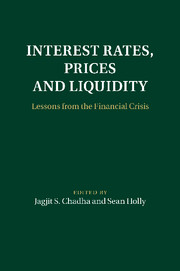Book contents
- Frontmatter
- Contents
- Figures
- Tables
- Contributors
- 1 New instruments of monetary policy
- 2 Liquidity and monetary policy
- 3 Interest rate policies and stability of banking systems
- 4 Handling liquidity shocks
- 5 Asset purchase policies and portfolio balance effects
- 6 Financial intermediaries in an estimated DSGE model for the UK
- 7 Central bank balance sheets and long-term forward rates
- 8 Non-standard monetary policy measures and monetary developments
- 9 QE – one year on
- 10 What saved the banks
- 11 Non-conventional monetary policies
- Index
- References
6 - Financial intermediaries in an estimated DSGE model for the UK
Published online by Cambridge University Press: 05 November 2011
- Frontmatter
- Contents
- Figures
- Tables
- Contributors
- 1 New instruments of monetary policy
- 2 Liquidity and monetary policy
- 3 Interest rate policies and stability of banking systems
- 4 Handling liquidity shocks
- 5 Asset purchase policies and portfolio balance effects
- 6 Financial intermediaries in an estimated DSGE model for the UK
- 7 Central bank balance sheets and long-term forward rates
- 8 Non-standard monetary policy measures and monetary developments
- 9 QE – one year on
- 10 What saved the banks
- 11 Non-conventional monetary policies
- Index
- References
Summary
Abstract
Gertler and Karadi (2011) combined financial intermediation and unconventional ‘monetary policy’ in a DSGE framework. We estimate their model with UK data using Bayesian techniques. To validate the fit of the estimated DSGE model, we evaluate the model’s empirical properties. Then, we analyse the transmission mechanism of the shocks, set to produce a downturn. Finally, we examine the empirical importance of nominal, real and financial frictions and of different shocks. We find that banking friction seems to play an important role in explaining the UK business cycle. Moreover, the banking sector shock seems to explain about half of the fall in real GDP in the recent crisis. A credit supply shock seems to account for most of the weakness in bank lending.
Introduction
Gertler and Karadi (2009) (GK, henceforth) presented a DSGE model with financial frictions and unconventional monetary policy, calibrated for the US economy. Unlike Bernanke et al. (1999) and Kiyotaki and Moore (1997), the financial frictions directly originate in the financial sector: the financial intermediaries face an agency problem and their balance sheets are endogenously constrained.
- Type
- Chapter
- Information
- Interest Rates, Prices and LiquidityLessons from the Financial Crisis, pp. 144 - 171Publisher: Cambridge University PressPrint publication year: 2011
References
- 2
- Cited by



